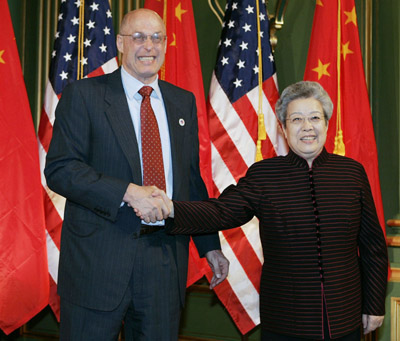US, China announce minor agreements
(AP)Updated: 2007-05-23 23:01
US Treasury Secretary Henry Paulson, in his opening remarks at a two-day "strategic economic dialogue" meeting with top Chinese officials, urged Beijing to take prompt action to redress "persistent trade and financial imbalances," saying Americans were "impatient."
American concerns over a burgeoning trade deficit with the Asian giant eclipsed the meeting as US lawmakers accused Beijing of keeping its yuan currency undervalued to make its exports cheaper -- a key factor cited by the US side for the snowballing deficit that hit 232 billion dollars last year.
The US lawmakers have threatened to push ahead with legislation imposing sanctions on Beijing if the Chinese refuse to make renminbi more flexible.
"Our policy disagreements are not about the direction of change but about the pace of change," Paulson told Chinese Vice Premier Wu Yi and 15 of Chinese ministers attending the talks with an equally strong US delegation, including Federal Reserve Chairman Ben Bernanke.
Paulson said the United States was "not afraid" of competition from China, which has emerged as a global manufacturing power and displaced the United States as the primary trading partner for many nations.
In an apparent reference to increasing anxiety in the US Congress, Paulson said there was growing "anti-China sentiment" as China became "a symbol of the real and imagined downside of global competition."
Wu, the top Chinese woman trouble-shooter, did not mince words in her opening comment.
"Politicizing trade and economic issues is absolutely unacceptable" and would "complicate the situation," warned the "iron lady" of China.
She also cautioned against the danger of injecting politics into US economic and trade relations.
|
|
China-US trade relations, she said, should be viewed as part of a long-term strategic relationship and "attempts to politicize economic and trade issues should be resisted.
"Problems and controversies should be handled calmly and addressed according to economic law," she said.
She noted that the United States, the world's most developed nation, and rapidly growing China were at different stages of development.
"We should not easily blame the other side for our domestic problems," she said.
Wu had also called on the United States, as a global leader in science and technology, to relax export controls and "reverse the trend of dwindling market share of American high-tech products in China."
But US Commerce Secretary Carlos Gutierrez emerged from the talks to dismiss any notion that American exports controls were curbing technology trade with China.
"We don't see our controls as a barrier to increase our hi-tech exports," he told reporters, citing a 44 percent increase in bilateral technology trade to 17.7 billion dollars last year from 2005.
He said however that the two sides agreed to focus on health care, computer systems, environmental systems and energy products to boost hi-tech trade.
Aside from currency, other US concerns cited were China's enforcement of intellectual property rights; implementation of World Trade Organization commitments; restrictions on US agriculture products; and tariff and non-tariff barriers on environmental goods and services.
US Trade Representative Susan Schwab said the Americans also raised the question of food safety at the talks amid reports about pet food and poison-tainted toothpaste from China.
The meeting is the second since Chinese President Hu Jintao and his US counterpart President George W. Bush agreed in August last year to launch the forum as a "management tool" for economic relations between the two top powers.
 | 1 | 2 |
|
||
|
||
|
|




